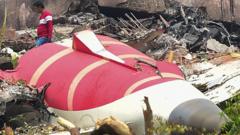India's Aircraft Accident Investigation Bureau (AAIB) remains undecided on the potential overseas analysis of the flight data and cockpit voice recorders from the Air India flight crash that occurred last Thursday, resulting in the deaths of at least 270 individuals. This Boeing 787-8 Dreamliner was on its way to London when it crashed shortly after taking off from Ahmedabad airport in the western part of the country.
While some reports suggested that the black boxes would be sent abroad, the Ministry of Civil Aviation clarified that no definitive conclusion had yet been reached. The AAIB is tasked with determining the analysis location after conducting a comprehensive assessment of the necessary technical, safety, and security parameters.
Both sets of Enhanced Airborne Flight Recorders (EAFRs) have been salvaged from the crash site, discovered on June 13 and June 16, respectively. These advanced devices are critical for capturing essential flight data, including gear lever positions, flap settings, thrust parameters, and engine performance metrics. This data is vital for reconstructing the final moments of the flight and elucidating the cause of the tragic event.
Concerns have arisen regarding the condition of the recorders, as some media reports indicated they may have sustained significant damage due to the fire that engulfed the aircraft post-crash, which could hinder data retrieval efforts in India. Industry experts suggest that one set of recorders might be sent to the United States to facilitate comparisons of the data extracted in India with that collected by the National Transportation Safety Board (NTSB). Captain Kishore Chinta, a former AAIB accident investigator, raised questions about the operational readiness of the newly established AAIB lab in Delhi for handling EAFR data downloads.
In related developments, N Chandrasekaran, chairman of Air India, disclosed that one of the engines on the crashed aircraft was recently replaced, while the other was not slated for maintenance until December. He confirmed that both engines had maintained a "clean" operational history. Meanwhile, Air India reported that inspections had been completed on 26 out of its 33 Boeing 787-8 and 787-9 aircraft, all of which were subsequently cleared for service. Following the crash, India's aviation regulator mandated additional safety checks for Air India's 787 fleet as a precautionary measure.
In a related announcement, Air India revealed a temporary reduction of flights on 16 international routes and the suspension of services on three overseas destinations between June 21 and July 15. This proactive approach is designed to facilitate enhanced pre-flight safety checks and adapt to increased flight durations caused by airspace restrictions in the Middle East. The airline had previously indicated a 15% reduction in operations involving wide-body aircraft for the same period.


















